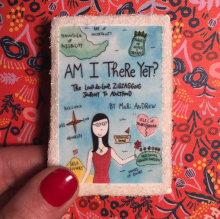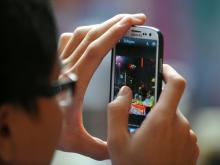
I FIRST CAME across digital media artist Madeleine Jubilee Saito’s work on social media. While scrolling through a sea of Instagram stories about environmental disasters, civil unrest, and humanitarian strife, I reached a square that made me pause: a multicolor four-panel image from a digital watercolor comic. I took in the top two panels of a gray figure staring out into the sky and then the glimmering, fruited foliage framing the bottom two panels. It felt like a vision from a better, more just future. The text on each panel, though brief, was powerful. I took in each word like a sacred telegram: THE GREAT WOUND / IS HEALED / ALL THINGS / MADE NEW.”
When I was younger, I found comfort in dynamic plotlines nestled in the predictable geometry of print and online comic series. Through Saito’s work, that comfort returned to me, in the form of four panels grappling with climate grief and environmental repair.
When I spoke with Saito about her work, she said that her affinity for comics started in high school. “As a young person, I had a very hard time accessing my own feelings or seeing that my interiority or my life were particularly valuable,” she said. “Comics were a way I could crystallize that value and the meaning of my own interiority for others — make it visible.” Now, Saito’s work conveys the value of the natural world. In her ecological storytelling, we see portraits of people amid towering trees and shimmering waterways. Her human subjects submerge themselves in the elements; her natural subjects invite readers to take a closer look at this numinous world.
Her upbringing in northern Illinois exposed Saito to the tensions between humans and earth. She grew up in a house deep in the woods — “a strip of forest in the middle of this desolate monocrop landscape,” she said, explaining how she saw beauty amid exploitation. “The animals — raccoons and possums — were pests to be managed. Every year the trees and bushes and plants from the forest would encroach further toward the house and every year they would need to be cut back.”
This awareness of the adversarial relationship with the natural world has guided her work and now culminates in her debut book, You Are a Sacred Place: Visual Poems for Living in Climate Crisis (Andrews McMeel, 2025). The first section explores the doom happening parallel to climate collapse. In one story, we see someone curled up in bed, sinking into and verbalizing their sadness post-job layoff. Wildfire smoke chokes the Seattle air around them. In this panel, I see myself, two years ago, numb from financial despair while wildfire smoke cast a noxious orange hue over Philadelphia.

Happy birthday, darling. So sorry this post comes 11 days after your actual birthday.

IF ASKED “What era would you time travel to if you could?” many young Black and brown and Indigenous people would answer in a flash, “None of them.” Why? We’re too aware of the past and what it means for us today—we tweet about the results of American slavery and can break news of the latest injustice to emerge from centuries-long hatred of nonwhite skin faster than MSNBC. We feel the negative effects of history enough each day to not want to go back there.
But maybe we should. If all we see of ourselves on TV and social media is us sick, oppressed, or dead, what other understanding of ourselves do we miss? How can we remember that we are greater than the damage done—that our history holds more than that and so might our present?
Ruby Sales, founder and director of the SpiritHouse Project, helps young people invested in faith and social justice see themselves through the lens of their divine wealth and boundless potential rather than through eyes dimmed by media and versions of history shaped by white supremacy. Sales, who by age 17 was a Student Nonviolent Coordination Committee member registering people to vote in her home state of Alabama, has a Master of Divinity degree from the Episcopal Divinity School and is a preacher, speaker, and intergenerational mentor on racial, economic, and social justice. I spoke with her in December by phone. —Da’Shawn Mosley
Da’Shawn Mosley: I watched a YouTube video of you speaking in 2015 at St. Albans Episcopal Church in D.C. and was struck by what you said about today’s youth: that the most recent generations have incredible insight but haven’t lived enough to have hindsight.
Ruby Sales: Now that I’m working with young folks in my fellowship program and have had some time to weigh how things have changed from the ’90s to the 2000s, I think young people lack insight also. When you have been raised in a technological age, when history is no longer lived experience but is created on social media and reproduced through technology, I think that long-term memory is affected, as well as the ability to empathize and connect with human suffering. There is a difference between being able to theorize about human suffering and being able to feel it. All of these are challenges faced by generations raised in a technocracy—the decimation of history, of who we are as a people.

"It’s very easy for people to say, 'This will make you stronger,' or even, 'You’re strong already, you’ll get through this.' But that’s just not really the whole story."

An American missionary priest, killed in Guatemala in 1981, has moved a step closer to being named a Catholic saint, after Pope Francis declared him the first-ever American martyr.
The Rev. Stanley Rother, a priest from the Archdiocese of Oklahoma City, served for nearly 15 years in Guatemala before being shot dead, during the country’s bloody civil war that divided the country from 1960 to 1996.

The pope of the digital age is set to attract even more followers with the posting of his first Instagram photo. Having already claimed the title of the world’s most influential leader on Twitter—with over 27 million followers across his nine accounts—Pope Francis has a new social media platform in his sights.

A few weeks ago, I asked folks on Twitter, and specifically, my colleague Amy Simpson, who has recently published a book on mental illness and the mission of the church:
What do you think about the way people use words like “bipolar,” “crazy,” and “manic” when they really mean “moody,” “energetic,” “quirky” and even “fun?"
It’s part of a pattern I’ve noticed lately — and maybe you’ve noticed it too.
People with beautiful head shots, flawlessly designed websites, and enviable accomplishments insist that they are really just a ‘mess.’ Or that their families are ‘crazy.’ Or that their homes and lives are every bit as complicated and frustrating as everyone else’s … meanwhile, their Instagram feeds show nothing but beauty; if ‘chaos’ is there, it’s only ever of the picturesque kind.
There are no birdcages sprouting stalagmites and stalactites of bird droppings. There are no snotty-nosed, unwashed, half-dressed, hungry children who’ve never visited a dentist in their lives. There is food in the fridge and on the table, and it isn’t even growing mold or crawling with roaches or undulating with maggots. In fact, it’s from Trader Joe’s and may even be organic! There is no broken glass or police officers showing up because the neighbors heard screaming. There is electricity and running water and indoor toilets.
Yeah, there’s raised voices and tempers and conflicts. But that makes you human. Not crazy. Not dysfunctional. Not “a mess.”
On my first Patriots’ Day in Boston, I was enjoying lunch with several colleagues when someone rushed into the restaurant: There had been an explosion at the finish line of the Boston Marathon. Moments later, caravans of ambulances and police cars raced, and the reports of casualties rolled in.
In the hours and days that followed, social media became for me, and many others, a sacred space to share our prayers and words of disbelief.